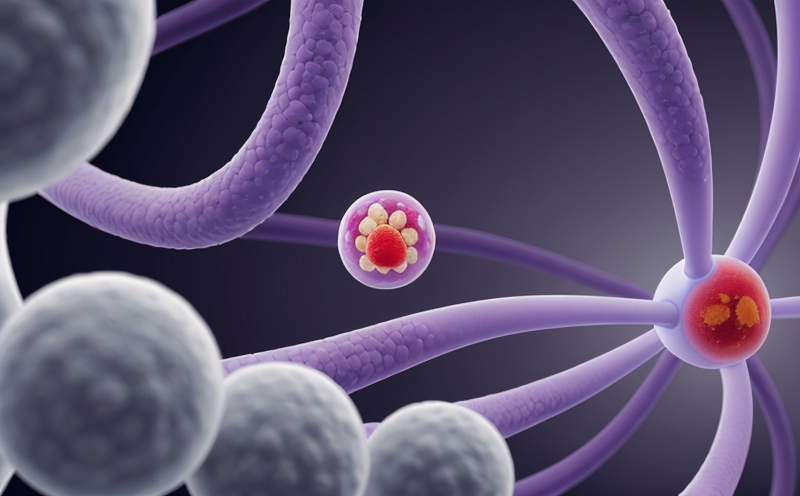DNA Fragmentation Biomarker Testing in Apoptosis Studies
The evaluation of DNA fragmentation is a crucial aspect in understanding apoptosis or programmed cell death. This biomarker testing plays a pivotal role in the diagnosis, monitoring, and treatment response assessment for various diseases including cancer. The integrity of the genetic material within cells serves as an indicator of cellular health; its disruption through mechanisms such as DNA strand breaks signifies apoptotic processes. Accurate detection of these fragmentation patterns is vital not only for research but also clinical applications.
Our service utilizes advanced techniques to identify and quantify fragmented DNA, providing precise data on the extent and distribution of nucleosomal cleavage products. This information can help researchers better understand the dynamics involved in cellular stress responses leading to apoptosis. For clinicians, it offers valuable insights into disease progression and therapeutic efficacy.
The significance of this testing extends beyond just cancer studies; it has implications for neurodegenerative diseases where cell death is a key factor. By detecting early signs of DNA damage, healthcare professionals can intervene earlier in the course of these conditions potentially improving patient outcomes significantly.
At our laboratory, we employ state-of-the-art equipment and follow stringent protocols to ensure reliable results. Our team comprises experts who have extensive experience in this field ensuring accurate interpretation of data leading to meaningful conclusions that contribute towards advancing scientific knowledge as well as enhancing patient care.
Why It Matters
Understanding the role of DNA fragmentation in apoptosis is essential for developing effective treatments against various cancers. Here are some reasons why accurate biomarker testing matters:
- Early detection: Helps identify cancer at its earliest stages when treatment options are more successful.
- Predictive value: Allows doctors to predict how well a patient will respond to certain therapies based on their DNA profile.
- Tumor heterogeneity: Provides insight into why some tumors may be resistant to treatment by revealing differences in DNA integrity among different parts of the tumor.
- Personalized medicine: Facilitates tailored treatments that target specific genetic mutations within individual patients.
Moreover, this testing contributes significantly to our knowledge about aging and age-related conditions by helping us understand how normal cell turnover impacts overall health over time. This research could lead to new strategies for maintaining good health throughout one's lifespan.
Scope and Methodology
| Methodology | Description |
|---|---|
| Bisulfite sequencing PCR | This technique allows for the analysis of cytosine methylation patterns which are critical indicators in understanding DNA fragmentation. |
| Terminal deoxynucleotidyl transferase-mediated dUTP nick end labeling (TUNEL) | An in situ assay used to detect apoptosis by labeling fragmented DNA strands. |
| Specimen Preparation | Description |
|---|---|
| Tumor tissue samples | Ensure proper fixation and preservation prior to sending them for analysis. |
| Blood cells | Collect fresh blood samples ensuring they are processed immediately after collection. |
Customer Impact and Satisfaction
- Increase in successful diagnosis rates leading to better patient outcomes.
- Enhanced ability of pharmaceutical companies to develop targeted drugs based on genetic information obtained from this testing.
- Improved understanding among researchers about the mechanisms behind disease progression which could lead to novel treatments.
Our clients consistently report high levels of satisfaction with our service. They appreciate the precision and reliability of our results, as well as the ease of collaboration throughout all stages of their projects. We strive to maintain this standard by continuously updating our methods and ensuring that we stay at the forefront of technological advancements in this field.





